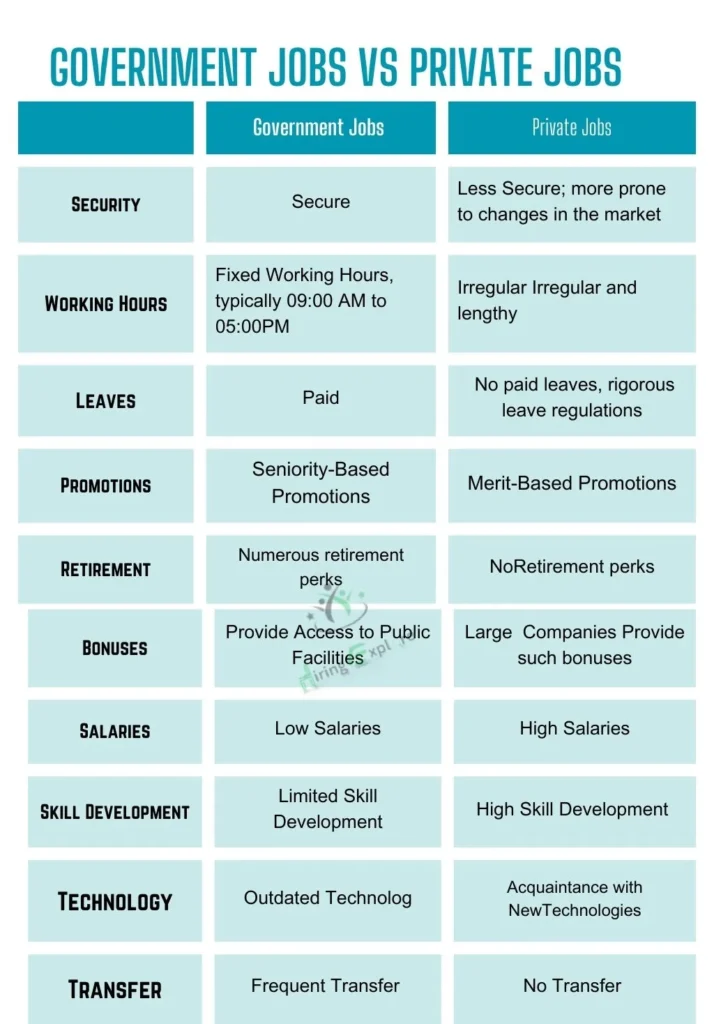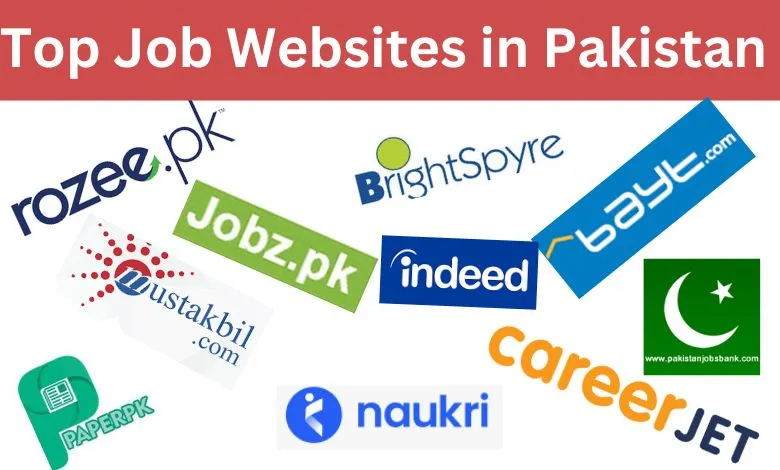Government Jobs vs Private Jobs In Pakistan
In Pakistan, job seekers have to make tough decisions when choosing jobs between private and government sectors. Everyone has a unique set of advantages and disadvantages. This article digs deeper into the benefits and drawbacks of both public and private work in Pakistan.

Benefits of Government Jobs in Pakistan:
1- Job Security
Security and Job stability is among the biggest advantages of working for the government. Job positions in the public sector are less impacted by changes in the market than positions in the private sector. Workers in WAPDA (Water and Power Development Authority) and Pakistan Railways, for instance, usually have steady employment tenure.
2- Attractive Pension Plans
Pension benefits are guaranteed to government employees after they retire. For people who are worried about their future financial security, this is a big relief. Companies like as Employers such as Pakistan Post and the Pakistan Armed Forces provide generous pension programs to their staff members.
3- Fixed Working Hours
Pakistani government positions often have set working hours, which are typically from 9 am to 5 pm. For instance, regular work schedules at NADRA (National Database and Registration Authority) enable employees to better manage their personal and professional lives.
4- Medicinal Advantages
For themselves and their families, government personnel are entitled to a wide range of medical benefits. For instance, free medical care is available at government facilities for those employed by the Pakistan Telecommunications Authority (PTA).
5- Paid Leaves:
Workers are entitled to a variety of paid leaves, such as yearly, medical, and casual leaves. Large company employees such as the State Bank of Pakistan (SBP) are entitled to a range of paid leaves.
6- Seniority-Based Promotions
To ensure job development, promotions in government positions are frequently determined by years of service and seniority. It is customary for Federal Public Service Commission (FPSC) employees to receive promotions following their duration of service.
7- Subsidized Housing
Housing subsidies or allowances are given to a large number of government workers. Officers in the Pakistan Army, for instance, have access to reasonably priced, well-maintained military accommodation.
8- Retirement Benefits:
Numerous retirement perks, such as gratuities and provident funds, are offered to employees of government agencies. Government department employees who work as civil servants are entitled to a lump sum retirement payout.
9- Allowances and Bonuses:
Travel expenses are among the many perks and benefits that government workers frequently get. For instance, additional allowances are provided to Federal Investigation Agency (FIA) officers in exchange for their services.
10- Access to Public Facilities
Employees of the government frequently get priority access to public spaces including transportation, hospitals, and schools. For example, preferential care is given to staff members at state hospitals such as PIMS (Pakistan Institute of Medical Sciences).
Disadvantages of Government Jobs in Pakistan
1- Limited Career Growth
Promotions in government positions are typically determined on seniority rather than merit. For example, it could take years for a junior clerk in the Education Department to get promoted.
2- Lower Salaries:
Salary ranges for government employment are often lower than those in the private sector. A software engineer employed by a government IT department typically makes a lot less money than one employed by a private IT firm.
3- Rigid Work Environment
The work environment in government jobs is formal and bureaucratic. Employees at the Passport Office, for instance, are bound by rigid procedures, which leaves little opportunity for innovation.
4- Limited Skill Development:
Employees in some government agencies have less opportunity to expand their skills since those departments lack modern technology. Employees at the Public Works Department, for instance, might not be familiar with the newest innovations in construction technology.
5- Political Interference:
Political influence can occasionally affect government employment and have an impact on decision-making procedures. For instance, political connections may have an impact on appointments made in public universities.
6- Inflexible Working Hours:
Even though government occupations have set hours, they are often non-flexible and do not allow for remote work. Regardless of personal emergencies, government hospital staff members are required to follow their established timetables.
7- Limited Incentives
Government employment do not offer incentive programs such as profit-sharing or stock options, except from base pay and allowances.
8- Bureaucratic Delays:
Red tape from government agencies can make it difficult to complete things quickly. For instance, it may take months for the Planning Commission to approve project funds.
9- Outdated Technology:
Employee access to contemporary tools is restricted by the widespread usage of antiquated technologies in many government agencies. For example, the Pakistan Post is still getting used to digital media.
10- Transfer Policies
Transfer regulations are frequently applied to government personnel, which might cause disruptions in their personal lives. Teachers in government schools, for instance, can be abruptly sent to a rural location.

Benefits of Private Jobs in Pakistan
1- Higher Salaries
In Pakistan, private businesses typically pay more than government positions. For example, compared to their government counterparts, employees of international firms such as Unilever Pakistan and Nestlé Pakistan frequently receive excellent pay.
2- Merit-Based Promotions:
In private companies, promotions are typically awarded based on performance. A competitive environment is fostered by the promotion of workers based on their skill set and job performance in organizations like Engro Corporation and Telenor Pakistan.
3- Development of Skills
Jobs in the private sector frequently need for ongoing education and skill development. To keep them current in their specialties, Systems Limited’s IT professionals, for instance, receive training in the newest technology.
4- Adaptable Work Schedules:
Numerous private businesses provide possibilities for work-from-home or flexible scheduling. Tech workers at organizations like NETSOL Technologies benefit from flexible work schedules that promote a healthier work-life balance.
5- Performance Bonuses:
Performance-based bonuses are a common feature of private companies. For instance, Mobilink’s sales representatives are paid yearly bonuses that are determined by their sales goals.
6- Opportunities for Career Growth:
The private sector provides several avenues for quick professional advancement. Based on their performance and experience, workers at companies like Habib Bank Limited (HBL) can advance through the ranks quite quickly.
7- Acquaintance with New Technologies:
New technologies are more likely to be adopted and funded by private businesses. Professionals have the chance to work with cutting-edge technologies at software houses like VentureDive.
8- Diverse Job Roles:
Jobs in the private sector allow people to pursue several career pathways because they offer a varied range of tasks and responsibilities. For instance, organizations like Procter & Gamble provide a variety of jobs in marketing and finance.
9- International Exposure
International exposure can be accomplished through private firms, particularly multinational companies. Workers in companies such as PricewaterhouseCoopers (PwC) and KPMG may have the opportunity to work on international projects.
10- Incentive Programs
Incentives like profit-sharing and stock options are frequently provided by private businesses to encourage staff members. For example, high-performing staff members at GlaxoSmithKline (GSK) are eligible for incentive plans.
Disadvantages of Private Jobs in Pakistan
1- Job Insecurity
Jobs in the private sector are more susceptible to changes in the market, which might result in layoff during recessions. If the market is unstable, bank employees such as UBL may lose their jobs.
2- Long Working Hours
The working hours of many private enterprises are irregular and lengthy. For instance, in order to fulfill client deadlines, staff at advertising companies are required to work late into the night.
3- High Work Pressure
Jobs in the private sector can include intense performance demands. Telecommunications company sales executives are often under pressure to hit their quotas.
4- Limited Job Benefits
Private sector occupations might not provide comprehensive health or pension benefits, in contrast to government employment. It’s possible that small businesses don’t offer retirement programs or health insurance.
5- Lack of Paid Leaves
Private businesses might have rigorous leave regulations. If call center workers take unpaid leaves, their salary may be withheld.
6- Frequent Job Switching
Employees in the private sector frequently change jobs due to work discontent or better possibilities, which causes job instability.
7- Corporate Politics
In private enterprises, office politics can be commonplace. Workers in cutthroat fields like advertising and media may have internal disputes about rewards and promotions.
8- Lack of Job Autonomy:
Private company employees, particularly lower-level employees, frequently have limited control over their work. Workers in manufacturing companies are required to adhere strictly to management directives.
9- Limited Job Roles
Private businesses may assign workers to specialized positions that limit their exposure to various business facets.
10- Performance-Based Layoffs
Workers who don’t reach performance goals risk losing their jobs. For example, failing to reach a sales target could result in the termination of a sales executive working for a retail company.
Conclusion
In Pakistan, selecting between private and public employment is based on personal objectives and preferences. Private sector jobs offer better pay, possibilities for skill development, and promotions based on merit, while government jobs give stability, set hours, and benefits like pensions. Both have advantages and disadvantages, and being aware of these factors can help job searchers make wise judgments about their careers.


